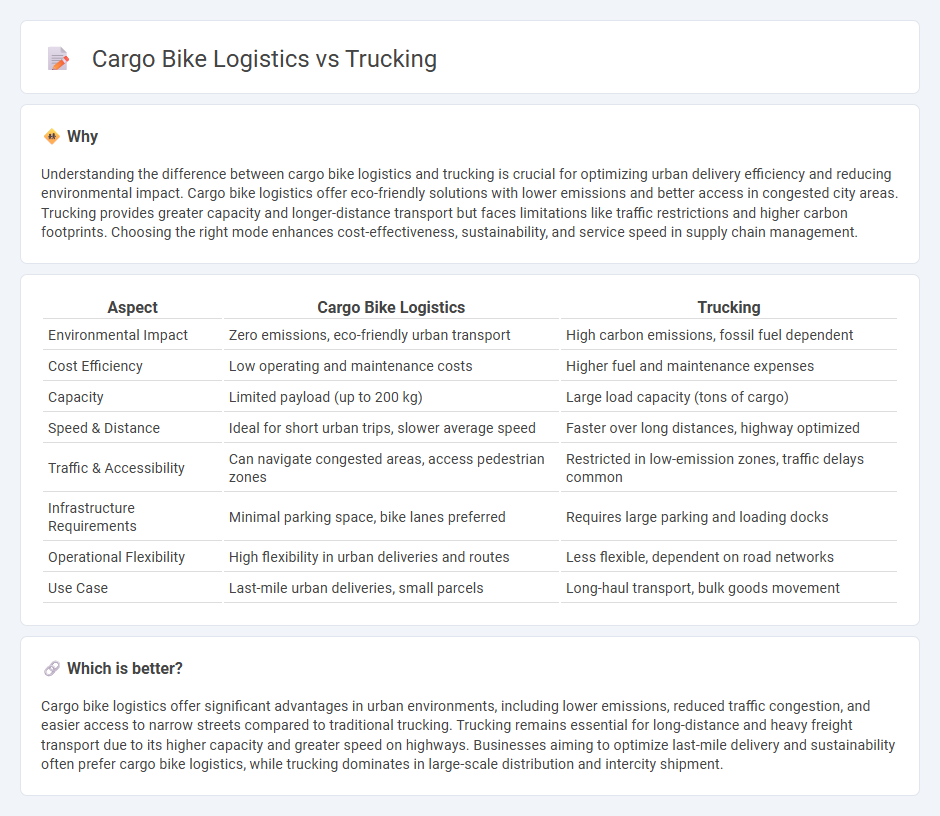
Cargo bike logistics offers a sustainable and efficient alternative to traditional trucking by reducing emissions and navigating congested urban areas more effectively. Unlike trucks, cargo bikes require less space for parking and can access narrow streets, making them ideal for last-mile deliveries. Explore how integrating cargo bike logistics can transform your supply chain and enhance urban delivery strategies.
Why it is important
Understanding the difference between cargo bike logistics and trucking is crucial for optimizing urban delivery efficiency and reducing environmental impact. Cargo bike logistics offer eco-friendly solutions with lower emissions and better access in congested city areas. Trucking provides greater capacity and longer-distance transport but faces limitations like traffic restrictions and higher carbon footprints. Choosing the right mode enhances cost-effectiveness, sustainability, and service speed in supply chain management.
Comparison Table
| Aspect | Cargo Bike Logistics | Trucking |
|---|---|---|
| Environmental Impact | Zero emissions, eco-friendly urban transport | High carbon emissions, fossil fuel dependent |
| Cost Efficiency | Low operating and maintenance costs | Higher fuel and maintenance expenses |
| Capacity | Limited payload (up to 200 kg) | Large load capacity (tons of cargo) |
| Speed & Distance | Ideal for short urban trips, slower average speed | Faster over long distances, highway optimized |
| Traffic & Accessibility | Can navigate congested areas, access pedestrian zones | Restricted in low-emission zones, traffic delays common |
| Infrastructure Requirements | Minimal parking space, bike lanes preferred | Requires large parking and loading docks |
| Operational Flexibility | High flexibility in urban deliveries and routes | Less flexible, dependent on road networks |
| Use Case | Last-mile urban deliveries, small parcels | Long-haul transport, bulk goods movement |
Which is better?
Cargo bike logistics offer significant advantages in urban environments, including lower emissions, reduced traffic congestion, and easier access to narrow streets compared to traditional trucking. Trucking remains essential for long-distance and heavy freight transport due to its higher capacity and greater speed on highways. Businesses aiming to optimize last-mile delivery and sustainability often prefer cargo bike logistics, while trucking dominates in large-scale distribution and intercity shipment.
Connection
Cargo bike logistics complements trucking by providing efficient last-mile delivery solutions in urban areas where large trucks face restrictions or congestion. Integrating cargo bikes with trucking fleets reduces delivery times, lowers transportation costs, and minimizes carbon emissions. This multimodal approach enhances supply chain efficiency by optimizing route planning and enabling seamless transfer of goods between trucks and cargo bikes.
Key Terms
Last-Mile Delivery
Trucking offers higher capacity and speed for last-mile delivery, supporting large-scale distribution with extensive range and heavy payloads. Cargo bikes excel in urban environments, providing eco-friendly, cost-effective, and agile solutions for navigating congested streets and reducing emissions. Explore the advantages of each mode to optimize your last-mile delivery strategy effectively.
Payload Capacity
Trucking logistics offers significantly higher payload capacity, typically ranging from 10,000 to 80,000 pounds, enabling the transport of large volumes and heavy goods over long distances. Cargo bikes, with a payload capacity usually between 100 to 300 kilograms, excel in urban environments by providing efficient, eco-friendly delivery for smaller, agile shipments. Explore the detailed comparison of trucking and cargo bike payload capacities to optimize your logistics strategy.
Urban Accessibility
Urban accessibility significantly improves with cargo bike logistics as they navigate narrow streets and reduce congestion compared to traditional trucking, which often faces restrictions in city centers. Cargo bikes offer eco-friendly solutions by lowering emissions and noise pollution in dense urban environments. Explore how integrating cargo bikes can transform your urban logistics for enhanced efficiency and sustainability.
Source and External Links
Trucking industry in the United States - Wikipedia - The trucking industry is vital to the U.S. economy, transporting raw materials, goods, and finished products with over 80% of communities exclusively relying on trucks for deliveries, directly contributing about 5% to GDP and employing 10 million people across many small businesses.
The Trucking Alliance: The Alliance for Truck Driver Safety & Security - The Trucking Alliance is a coalition dedicated to improving safety in the U.S. trucking industry by advocating for reforms like expanded use of electronic logging devices, mandatory drug testing, higher insurance minimums, and the use of automated technologies to assist drivers.
Hirschbach: Not Your Typical Trucking Company - Hirschbach is a veteran-owned trucking company specializing in refrigerated transportation for perishable goods, offering dedicated, expedited, and logistics services with a driver-focused approach recognized by multiple industry awards.
 dowidth.com
dowidth.com